Memoirs & Diaries - The Corridor
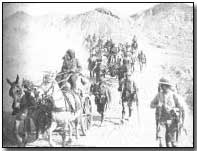 The camp at Sheikh Saad in
March 1916 was bearable. The soil had not been powdered by the feet of
the multitudes who later passed through it. The desert beyond was
clothed with a rich verdure, which in the early morning was drenched with
dew. The Tigris flowed past in flood, for the snow was melting on the
distant mountain peaks. We strengthened its bonds as we had improved
the roads on Lemnos previously.
The camp at Sheikh Saad in
March 1916 was bearable. The soil had not been powdered by the feet of
the multitudes who later passed through it. The desert beyond was
clothed with a rich verdure, which in the early morning was drenched with
dew. The Tigris flowed past in flood, for the snow was melting on the
distant mountain peaks. We strengthened its bonds as we had improved
the roads on Lemnos previously.
We learned something of the position before Kut-el-Amara, where Townshend was beleaguered, though not much, conjecture and rumour filling the gap. We learned of the Turkish position at Um-el-Hannah - the gateway of the corridor to Kut.
One night we set out for an unknown destination. The day had been hot, but just before dusk there came a thunderstorm, and the rain was torrential. Very soon we realized that the going was unusual. On the granite-like subsoil was a thin layer of mud, and our feet would not stick in it. Soon men and mules were floundering in a sea of slime. Darkness closed in on a scene unparalleled, and the flickering lightning added to its weirdness.
Towards the Euphrates the horizon glowed like the front of Mars. Through the long night we struggled and scrambled over the nullahs, blaspheming and cursing, until the sun rose, disclosing a mob of exasperated and exhausted men, reeling through the morass towards the camp at Orah.
Later in the day we crossed the Tigris, and evening saw us drawing near to the ominous mounds of earth at Um-el-Hannah. For the first time we heard the scream of shrapnel in that country, and to many of us it was our baptism of fire. The trivial details of our life in the trenches are now almost lost to the memory, but the night of April 4th looms conspicuously.
There was a dug-out open to the sky. In the centre the dying embers of a fire glowed feebly. The night was bitterly cold, and we huddled near it for warmth, for we were clad in drill and without greatcoats. Through the opening to the dug-out could be seen others of our company sitting on the fire-step of the trench.
Their faces were grimly apprehensive, for the Turks were peppering the sandbags with machine-gun and rifle-fire. The sand was trickling down from the parapet, and over the dug-out poured a continual stream of whistling bullets.
There was a man of my own town near by, young Brandreth, and we discussed the morn and its chances. There was also a man with unusually bright and piercing eyes and gypsy-like countenance. He sat apart and was very quiet. I was smoking a cigarette. The tense atmosphere must have got on his nerves, for he turned towards me and said, "Can you spare a cigarette, corporal?" "Yes," I replied. "Here you are, Jaspar. I'm nearly stumped, but you can have one."
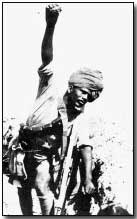 Our talk ceased and
drowsiness overcame us. I must have slept. I was awakened by a
hand gripping my shoulder and the voice of the platoon commander saying,
"Here, corporal, a couple of hard-boiled eggs for breakfast; put them in
your haversack." Hard-boiled eggs. How funny!
Our talk ceased and
drowsiness overcame us. I must have slept. I was awakened by a
hand gripping my shoulder and the voice of the platoon commander saying,
"Here, corporal, a couple of hard-boiled eggs for breakfast; put them in
your haversack." Hard-boiled eggs. How funny!
I held out my hands, and felt the contact of cold metal and the familiar knobs of the hand-grenade. I came back to reality with a start. "And waken us," he continued, "at three o'clock, please." The night grew colder, and we watched the glittering galaxy of stars move overhead, and waited for the hour.
At dawn the company filed into another trench, and we cut notches for our feet, for it had no fire-step. Our guns were bombarding the front heavily. In the opening of a fire-trench near-by a white-faced, scared-looking boy leaned against the parados with blood streaming down his face. He had done his bit; ours was to come.
The height of the trench was well above my head, and the soil loose, but the friendly hand of a more nimble comrade helped me to a view of the war in microcosm, for the front here was narrow, not above 2,000 yards at a guess, with the Tigris on the left and the marsh on the right.
Right in front was a mound, and the shells were bursting about it, and the clouds of dun and white smoke were interspersed with vivid flashes, like a volcano in eruption, both beautiful and terrible. On the mound was a man gesticulating wildly, signalling the gunners to cease fire.
The Turks had fled and our men were in the shambles intended for them. Leaping the criss-cross of trenches we soon found ourselves on undisturbed soil, on which were strewn the bodies of our own people. They lay very quiet and very still, and took no notice of our passing.
On we went, now the vanguard of the little army which broke the barrier at Um-el-Hannah. We formed column of route and pursued the vanishing Turk down the long corridor to Kut-el-Amara. Falahiyah was now the objective.
Shell fire and the crack of rifles compelled us to open out, one of our company dropped. Very soon the gleaming earthworks were visible. We advanced over the level field by sectional rushes. Brandreth and I had a canvas water bucket containing bombs. Its presence was abominable. We speculated fearfully on the result that might follow a broken pin.
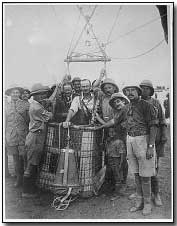 On one occasion we rested
rather longer than usual. Jaspar was second on my right. A boy
lay between us. Without raising his head, he turned his face towards
me, and observed that Jaspar was asleep.
On one occasion we rested
rather longer than usual. Jaspar was second on my right. A boy
lay between us. Without raising his head, he turned his face towards
me, and observed that Jaspar was asleep.
"Asleep?" I replied incredulously. "For God's sake waken him!" The boy stretched his arm to waken him, but turned again quickly. "Corporal," he said falteringly, "Jaspar's dead; his neck's bleeding."
Soon we were well within range of the Turkish guns, and the whole battalion in alignment. The order came to make cover with our entrenching tools, a grievous task lying prone under a broiling sun. Mason, a wiry little fellow from a cotton town, was on my left, with Brandreth between. Mason, when his task was accomplished, settled down to rest and observation.
Over-curious, he raised a shoulder above the level of his little parapet, a rifle crashed, and with a groan he subsided. Brandreth had the task of giving first aid. It was accomplished without further mishap. Mason was very restless and breathing heavily. He turned, exposing himself once more, another crack and another groan, and he lay very quiet.
On my right was a tall strong youth who used his cutting tool to great advantage. An excellent parapet was the result and an oblong cavity sufficiently long and deep to shelter his whole body. As the sun rose to its zenith we became hot and weary. The tall youth lay on his back and fell asleep.
It must have been his habit when sleeping to draw his knees up. I had to caution him about it. Unobserved by us, he must have slept again. A crack from a rifle and the tall youth collapsed with a bullet through both knees.
So the long weary day passed, until dusk came and the order to evacuate the wounded. Later we followed, crossing the new trench dug under our protection, leaving Falahiyah and the Turks to other and fresher troops.
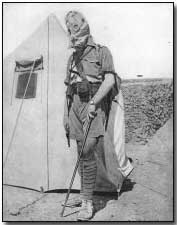 We returned to
Um-el-Hannah, and going there we were once more caught in a deluge of rain.
How the wounded fared is unthinkable. Eventually we reached the place
of bivouac, and stood about drenched and cold waiting for the dawn.
We returned to
Um-el-Hannah, and going there we were once more caught in a deluge of rain.
How the wounded fared is unthinkable. Eventually we reached the place
of bivouac, and stood about drenched and cold waiting for the dawn.
Great was our relief when the camp fires gleamed in the early morning mists, and loud were the acclamations and shouts of joy when o'er the eastern hills the sun arose and ushered in bright day.
April 5th and 9th, 1916, stood out in our battalion annals. So I can safely say that the eve of the 9th saw us tramping down the corridor once more. This time to Sanna-i-yat, Falahiyah in the meantime having fallen into our hands.
Once again the night was overcast. So thick was the gloom that the nearest objects were hidden from us. The path was fairly good and well-trodden. At one point we seemed to run close to the Tigris bond, and it was here that we passed a stack of discarded rifles with bayonets attached.
The platoon commander slipped from the ranks and took one from the stack. A stern reminder of coming events. What other troops were making for the rendezvous and what already there I could not say. Of Sanna-i-yat defences we knew nothing.
Eventually we found ourselves drawn up in line. In front was impenetrable darkness; no stir, no rap-tap-tap from a machine gun; no crack from a sniper's rifle.
We were told to lie down. Of the distance between us and the Turkish trench we had no knowledge. The herbage was wet with dew, and while I lay there shivering I thought of Magersfontein, for I was as old as Brandreth, who lay by my side, when news of the Black Week came through from South Africa. And now we were up against troops adept in the use of small arms and trench defence, many of them veterans of the Balkan wars.
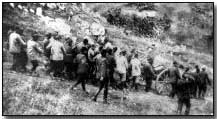 At
last the agony of suspense was over. A rippling movement from the left
and we were standing, a similar movement and we were moving forward.
At
last the agony of suspense was over. A rippling movement from the left
and we were standing, a similar movement and we were moving forward.
The silence was now broken by the swishing of many feet through the herbage, by the rustle of clothes, and the clicking of bayonet scabbards.
We were uncomfortably crowded. Brandreth and I had decided to remain together if possible. The order came to incline to the left. The men on our right were soon in difficulties. Possibly some trench or nullah interfered with their formation. There was a tendency to run, and then to buckle. Shortly we had a phalanx instead of a line.
I was separated by the crush from Brandreth, and very I soon lost view of the platoon commander. At all costs, I must regain touch, I thought, and was still worrying about my predicament when a flare curved over, showing up our front in a great white light.
Then out of the dark came a hurricane of screaming lead and shot, so staggering that the men reeled under it in confusion. There was a rush forward on my left, instinctively I followed, and found myself against a bank or nullah, behind which I took cover along with the others.
I quickly realized that this was wrong, so turned from the nullah and ran forward. I found myself going over a white patch of ground, bare of grass, and already littered with the accoutrement of the wounded. I was alone. The machine-gun and rifle-fire seemed to gather intensity.
My sole thought on that short run was where the impact of the bullet would be. The irresistible impulse for self-preservation came uppermost again, and I flung myself on the ground, this time my cover being a discarded valise. I was now conscious of the dawn, and, peering forward, saw a trench. My first thought was, I am there!
This did not seem to worry me much, not near so much as the infernal screaming overhead; but when I became accustomed to the gloom I noticed that the faces in the trench were turned from me. Then came a hoarse voice calling, "Come on, mate!" The firing was now less intense. I rushed forward and saw at once that the attack had failed. The Turks remained secure behind their wire.
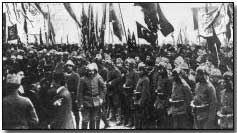 All
was quiet in front. The dim outline of the Turkish trench showed no
breach. The scattered forms of the wounded and dead lay round about.
All
was quiet in front. The dim outline of the Turkish trench showed no
breach. The scattered forms of the wounded and dead lay round about.
On the left a few Turks came through the wire and began to bludgeon the wounded with the butt-ends of their rifles. They were soon driven back.
Nothing further could be done. So when the morn advanced we sought our depleted and scattered units, feeling subdued and shaken in spirit. The platoon had suffered severely. The commander was killed, also the sergeant and many others. Brandreth I never saw nor heard of again.
Soldiers have a nice sense of delicacy. They did not pry too closely into each other's movements on that fatal morning. They realize that success in war, as in other affairs of life, depend largely on circumstance. Neither did they blame their harassed leaders, though there was bitter comment because they felt they had not been given a fair chance.
Corporal T. Clayton enlisted January 1915, in the Cheshire Regt. Embarked for Gallipoli in November 1915. Arrived in Mudros harbour, but sent to Alexandria. Back at Lemnos at Christmas, stayed until the 8th Cheshires arrived from Cape Hellas, and joined them. Sent to Port Said in January 1916, and from thence to Mesopotamia. Took part in the Townshend relief operations on both banks of the Tigris, in the spring and early summer of 1916, and in the offensive against Kut 1916-1917. Took part in operations on the Shatt-el-Adhaim in April 1917, and in subsequent minor operations. In the Abu-Hajar pass until the end of the War.
First published in Everyman at War (1930), edited by C. B. Purdom.
Photographs courtesy of Photos of the Great War website.
Russia mobilised 12 million men during the war; France 8.4 million; Britain 8.9 million; Germany 11 million; Austria-Hungary 7.8 million; Italy 5.6 million; and the USA 4.3 million.
- Did you know?
